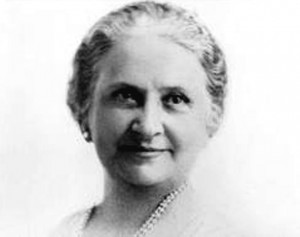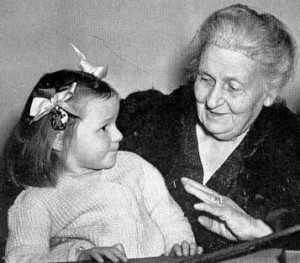
Maria Montessori, born 1870 in Italy, was one the most influential educators in the 20th century. She was the first woman Medical Doctor in Italy and was one of the great pioneers in the study of child development. Upon graduation from Rome University Medical School in 1896, she worked with mentally deficient children, which reflected not only compassion, but also a rigorous scientific ability. She became a lecturer at Rome University and set down the foundation of scientific pedagogy in Italy.
In 1907, Dr. Montessori began her innovative approach with a group of children in the slum area of San Lorenzo in Rome. Within a year, her accomplishments with these children earned worldwide acclaim and became a landmark in the education of young children. What ultimately became the Montessori method of education developed there, based upon Montessori’s scientific observations of these children’s almost effortless ability to absorb knowledge from their surroundings, as well as their tireless interest in manipulating materials. Every piece of equipment, every exercise, and the method that Montessori developed was based on what she observed children to do “naturally,” by themselves, unassisted by adults.
She wrote many books on the various aspects of her theory and practice, and formulated her approach for elementary children in 1917 in the work The Advanced Montessori Method. While in India (1939 to 1945) Dr. Montessori studied the child in its early years. Her unique ability to observe children and gain insight into their development led her to design the education method which is known throughout the world as Montessori education.
Children teach themselves. This simple but profound truth inspired Montessori’s lifelong pursuit of educational reform, methodology, psychology, teaching, and teacher training—all based on her dedication to furthering the self-creating process of the child.
Today, over 100 years later, her schools continue to thrive and expand, a tribute to her inspirational insight, which has helped change the course of childhood education.
